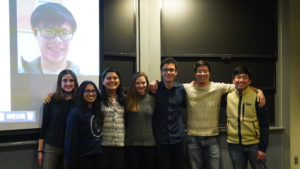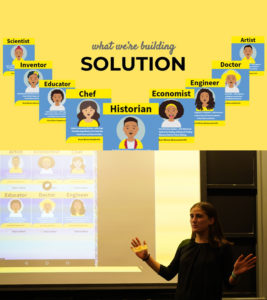The MIT Scheller Teacher Education Program/The Education Arcade is typically bustling during January’s Independent Activities Period or “IAP” at MIT. It’s a month when students can spend time on campus without their usual semester courseload, and when our lab hires undergraduates to help with project sprints (stay tuned for Part II with news from those teams). IAP is a great opportunity for students to do independent projects, take short courses, and just find time to play – and, in the spirit of all three, we offered a new IAP class this year, Mobile Edtech: MIT IAP Hackathon (CMS.S61/6.S189).

Students from MIT, Wellesley, and SUNY Stony Brook participated in Mobile Edtech, CMS.S61/6.S189.
Mobile Edtech was led by instructors Eric Klopfer, Erdin Beshimov, and Hal Abelson, with extra helpers from the App Inventor team, MIT Admissions, and our lab. The class packed a lot into four weeks, covering principles of learning, the affordances of mobile technology, and an MIT Bootcamp-style introduction to user research. Students worked with an ambitious timeline to develop working app prototypes and demo them at final presentations last week. They drew on user interviews, research, and mentorship for their designs; and students built apps based on their interests in learning Xcode, App Inventor, or native development environments.
Students teamed up to develop five mobile educational apps by the end of the month, and presented them to an audience of invited educators and entrepreneurs. Projects included:

Lindsey presents Mission to Mars.
- A platform to guide students in creating portfolios for college applications;
- An app to match underserved students in India with tutors and personalized learning;
- A mobile game that lets students explore careers in a playful mission to mars;
- A technology to broaden users’ exposure to videos outside their own media “bubbles”; and
- A mapping app to crowdsource information on where to find vending machines and other campus essentials!
For many students, IAP is a chance to tackle projects that are more ambitious than any they might do during a semester. Mobile Edtech students followed suit in their readiness to tackle their own ambitious learning goals as well as tackling ambitious challenges in education more broadly.

Mike presents Enlightened.
